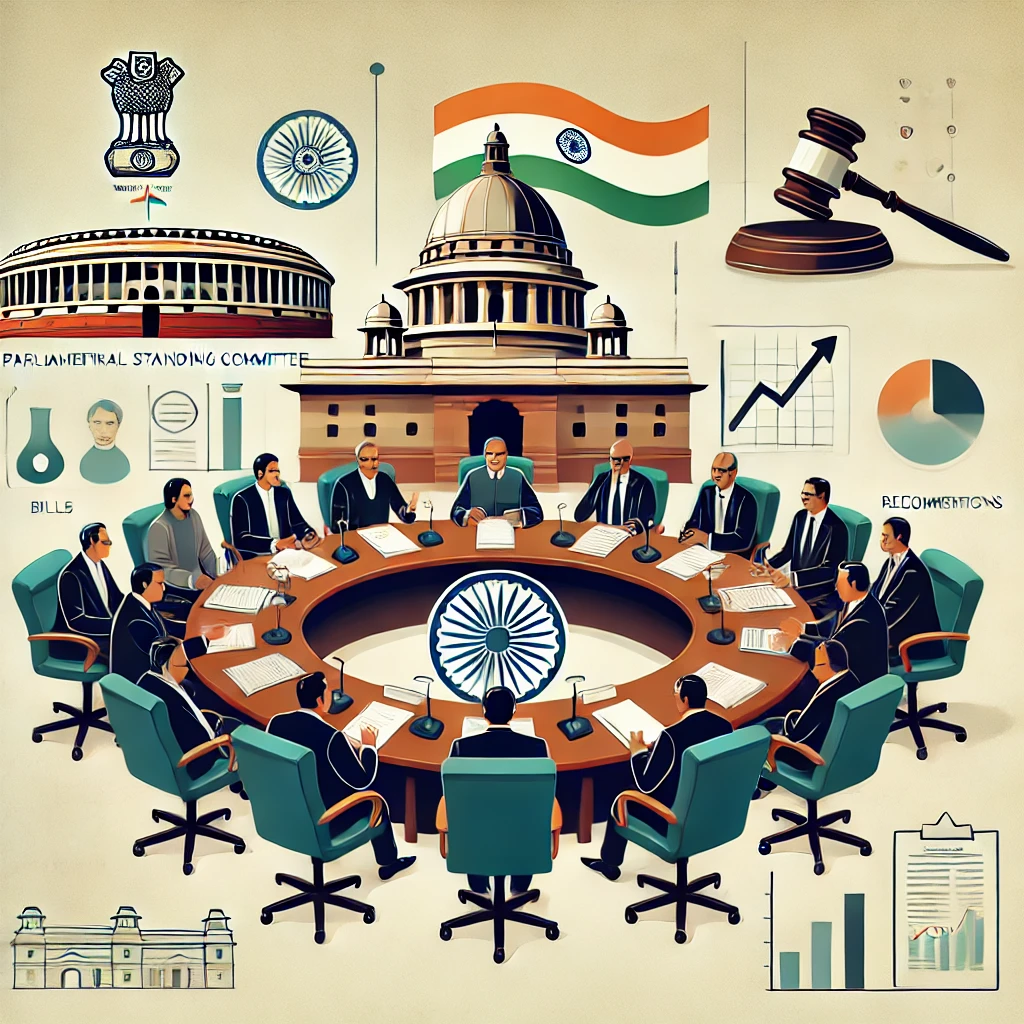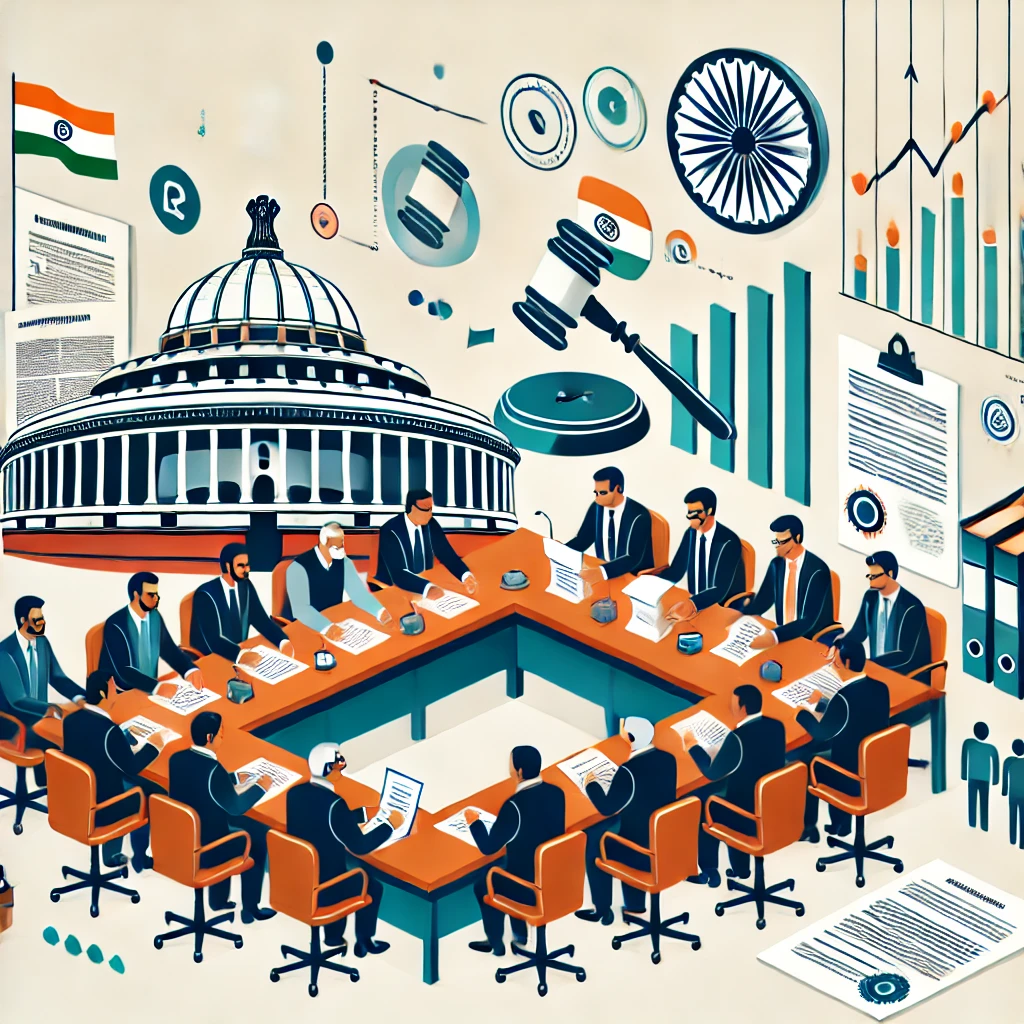The Parliamentary Standing Committee plays a crucial role in the Indian legislative process. These committees ensure that laws and policies are adequately scrutinized. They constitute an important vehicle for parliamentary oversight. Learning about what they are and how they work opens up learning about how democracy works in India.
- They increase parliamentary scrutiny.
- They consist of representatives from different parties.
- They meet with experts.
- They formulate reports for Parliament.
- They assist in the formulation and implementation of policies.
What are Parliamentary Committees?
The Indian Parliament has established its sub-group, which are Parliamentary Committees. Such committees have been constituted to efficiently handle particular kinds of work. Every parliamentary committee deals with subjects of governance differently. This arrangement ensures that the parliament manages the broad range of duties effectively.
Several problems receive detailed scrutiny in the Standing Parliamentary Committees. They make proposals regarding legislation and suggest improvements on these proposals. Their endeavor enhances accountability and allows greater transparency in governance. Let’s dig into what these committees include.
Role of Parliamentary Committees
The role of Parliamentary Standing Committees is meant to aid the legislative process. They ensure that laws made by Parliament are workable and useful. Committees study details on proposals before legislation. They listen to experts and stakeholders. This results in informed decisions.
Strengthening Legislative Scrutiny
Bills of proposed legislation are scrutinized by the parliamentary committees in detail. They evaluate the implications of laws and ensure that they result in sensible legislation. This makes it possible for bills improvement processes before being put to vote before Parliament.
Holding Government Accountable
Committees hold the government liable for their actions and decisions. They review policies and expenditures to ensure that the activities of the government serve public interests and comply with the legal framework in place. The accountability role enhances its transparency in governance.
Seeking Views from the Public
The committees invite experts and stakeholders to testify. The evidence-based approach doth enrich the discussions and lead towards informed recommendations. The involvement of knowledgeable peoples ensures that the process of legislation takes into consideration a diversity of perspectives.
Preparation of Detailed Reports
Through intense scrutiny, committees prepare reports. Their Parliamentary Standing Committee Reports summarize findings, suggest improvements, and highlight areas of concern. Such reports are passed on to both Houses to inform and guide legislative debates.
Promotion of Public Participation
Committees serve as a bridge connecting the government and citizens. The public issues and recommendations they resolve enhance the involvement of citizens in governance. This participatory approach has worked well in building and strengthening trust in policies that benefit the citizens.
Building across Party Lines
The members of the committees come from different parties. The very makeup calls for cooperation and consensus on pressing matters of concern. Eventually, it fosters a sense of cooperation that ensures effective governance without party lines.

Types of Parliamentary Committees
Each type plays a different role. Collectively, they provide a more complete view of governance. There are several types of parliamentary committees in India. Each type plays a different role. The major categories include:
Standing Committees
These are permanent standing committees in the Parliament, specialising in a particular area like finance, health or defense. They keep viewing and scrutinizing the bill that was to be passed through the parliamentary floor better and more through a vote.
Ad Hoc Committees
An Ad Hoc Committee is a committee established to deal with specific tasks or issues and, by the nature of things, is temporary. These committees, having resolved their objectives, dissolve, having conducted investigations or reviews on specific subjects. The establishment of an Ad Hoc Committee ensures that Parliament takes action reasonably promptly on issues of national importance.
Joint Committees
Joint Committees: Being the representative of both Houses of Parliament, Joint Committees encourage cooperation on key issues whenever the consensus between the two Houses is deemed necessary. A joint committee helps in making decisions by collective consent and facilitates better communication between both Houses. This structure solves complex problems well and considers diverse thoughts in the course of legislation.
Select Committees
These committees focus on particular bills or subjects. This way, it becomes easier to discuss and assess the subject in great detail. The Select Committees scrutinize the proceedings of proposed bills and present amendments or changes. Their product makes sure that the legislation is comprehensive and well-thought out, hence resulting in much more efficient and suitable legislation for the country.
Public Accounts Committee
This committee mainly analyses the expenditure of the government and its accounts. They check on the financial accountability with regard to the reports of Auditor General. The Public Accounts Committee normally plays an important role in detecting irregularities and bringing proper transparency on how public funds are used effectively and under the guidelines laid within the respective regulations.

Role of Parliamentary Committees
The Parliamentary Standing Committee plays various vital roles. Above all, it examines legislative proposals. Committees scrutinize bills prior to their introduction on the floor of Parliament. This ensures extensive examination. Committees can propose amendments in order to make legislation better.
Scrutiny of Legislation
The parliamentary committees grill the proposed bills in a precise manner. Consequently, it ensures that the legislation passed by the Parliament is a result of effective debating and leads to well-structured and relevant legislation.
Accountability towards the Government
Committees scrutinise governments’ policies, spending, and activities. By questioning officials and studying reports, they make the government answerable, so that the governing team serves the public’s best interest, as promised under their mandate.
Collecting Evidence
Committees collect evidence from experts, stakeholders, and the public. This evidence-based process enhances their understanding of issues and improves the quality of recommendations made to Parliament, supporting informed legislative deliberation.
Preparation of Reports
After thorough investigations and deliberations, committees prepare concise reports. These reports present findings, outline problems, and suggest changes that could be adopted for improving conditions. Parliamentary Standing Committee Reports are very good sources of information for parliamentarians, as these inform debate and assist legislative action.
Generating Discussion
Committees generate discussion from those attending other political parties. The environment is always conducive to developing discussions necessary to strike a universally common concurrence on matters of importance. These committees bring together the constituents of different political parties together into this cooperative environment to overcome the bipolar nature of various parties. They then pave ways for effective governance and decision-making.
Significance of Standing Committees of Parliament
The relevance of Standing Committees of Parliament cannot be overstated. They are a bridge between the government and the people. Working committees make people aware of government actions. Involving public participation in the legislative process, committees are the need of the hour in a healthy democracy.
- Improves Legislative Quality: Committees ensure that proper analysis of bills takes place and enhances the relevance and effectiveness of legislation before it reaches the floor of Parliament.
- It brings to check the government into book account where its policies and spending are analyzed for accountability and good governance.
- It informs decision-making because committees consult opinions and evidence from experts, which are grouped for vibrant discussions leading to informed decisions in the policy-making process.
- They create a link between citizens and government by fostering public participation and ensuring their concerns are heard in policymaking.
- Facilitates Bipartisan Co-operation: Committees are formed in the presence of members from different parties. This leads to co-operation and consensus on major national issues.
Challenges of Parliamentary Standing Committees
Parliamentary standing committees are important, but they are also full of several challenges. One of the main drawbacks in terms of time and resources can make them week. Members are likely to do multiple duties. It is likely to sideline the significant issues.
- Limited Time: Committees largely do not have the time necessary for the careful consideration of complicated issues and thus easily hinder their production quality.
- Lack of Resources: A committee may neither raise sufficient funds nor boast of sufficient numbers of staff members in investigating and gathering information.
- Party Politics : Party politics may intervene in the determination of committees. This is essential to prevent an objective analysis of issues.
- Lack of interest of members: There are some members of committees who may not be very interested in the exercise. In this way, participation and effectiveness may reduce.
- Overlapping Responsibilities: Several committees may address the same issues, which leads to duplication and overlap in the scrutiny of the legislature.
- Lack of Expertise: Members are not always as knowledgeable about the topics that they are called to discuss, thus limiting in-depth analysis depth.
- Public Awareness: Lack of understanding among the public about functions of committees will lead to disengagement with the process and voice by citizens, leading to loss of transparency.
- Coordination Issues: The meeting of the committee members who may have differing political interests will often lead to a default in the smooth performance of the committees.
- Complexity of Issues: Some issues are complex, which would be too heavy for committees and, hence difficult to properly scrutinise within the time available.
Conclusion
In short, the parliamentary standing committee is the key to good governance. It plays a role in scrutinising legislations and holding the government responsible. As time progresses, these committees will become more integral to the process. Strengthening democracy in India requires optimum performance in these committees.
| Parliamentary Standing Committee UPSC Notes |
| 1. Parliamentary Standing Committees are permanent committees established to scrutinize and examine the functioning of government ministries and departments. 2. Their primary role is to provide a forum for detailed examination of legislative proposals and the working of ministries, enhancing parliamentary oversight. 3. These committees usually consist of members from both Lok Sabha and Rajya Sabha, ensuring representation from various political parties. 4. There are two types of Standing Committees – Departmentally Related StandingCommittees (DRSCs) and Financial Committees (e.g., Public Accounts Committee, Estimates Committee). 5. They work throughout the year, unlike Parliament which meets for only a few sessions, enabling continuous oversight of government policies. 6. They allow for detailed and non-partisan discussions on various issues, enabling more in-depth policy analysis compared to Parliament sessions. 7. These committees present reports to Parliament, which can influence government policy and provide insights into administrative lapses. 8. Although their recommendations are not binding on the government, they often lead to significant policy improvements and legislative changes. |



